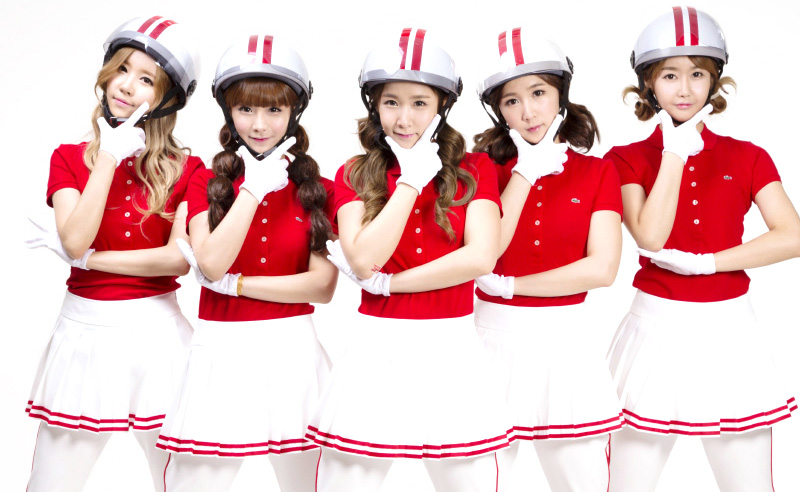 Picking up the discussion where we left off in Part 1 of this week’s extended Roundtable, Crayon Pop has recently been receiving a bit of attention from Western media outlets from the likes of ABC News, Time Magazine, and Billboard, largely due to the strings pulled by their new overseas distributing label, Sony Music. While general Western audiences still remain largely unaware and uninformed of the Crayon Pop phenomenon, the opportunity to gain exposure to them is growing. With that said, is Crayon Pop going to be good or bad for K-pop? That is, will “Bar Bar Bar” hurt or help the K-pop brand in the eyes of the world?
Picking up the discussion where we left off in Part 1 of this week’s extended Roundtable, Crayon Pop has recently been receiving a bit of attention from Western media outlets from the likes of ABC News, Time Magazine, and Billboard, largely due to the strings pulled by their new overseas distributing label, Sony Music. While general Western audiences still remain largely unaware and uninformed of the Crayon Pop phenomenon, the opportunity to gain exposure to them is growing. With that said, is Crayon Pop going to be good or bad for K-pop? That is, will “Bar Bar Bar” hurt or help the K-pop brand in the eyes of the world?
Pat: Crayon Pop is neither good or bad for K-pop. The band, or rather the concept of the band, is just another step in the forever moving escalator that is K-pop. There have been dance crazes before and they’ve come and gone. As for “Bar Bar Bar,” it might hurt more than help when one considers that prior to the song, “Gangnam Style” would be most people’s introduction to K-pop. It would build a reputation that this is all K-pop is: a bunch of Koreans who like to make fun videos with fun dances that don’t take themselves seriously.
Sahar: I just can’t imagine that “Bar Bar Bar” is possibly important enough to have much of an impact on K-pop’s reputation in places where K-pop is not already big. At least in the case of the US, there are other artists who are doing things much more relevant and likely more interesting in the marketplace. In places where it is already big, people are aware that there are tons of other songs, many of them more awesome.

Kelsey: Rather than say Crayon Pop is bad for K-pop, I’ll say that the craze perpetuates an implication that the only K-pop that’s going to succeed on a global stage has to be humorous. Regardless of whether they succeed or not, it’s clear that Crayon Pop’s agency was trying to use the “Gangnam Style” formula to get attention. How do K-pop groups that want to just present visuals and music as is, with no humor, do that in light of the precedent of “Gangnam Style?” I think that’s the real issue we’re grappling with when we talk about groups like Crayon Pop trying to go global.
“Bar Bar Bar” may be quirky, but it’s something that’s not meant to be understood by international audiences. Its appeal is supposed to come only from the catchiness and possible “weirdness” of the music video. Individually, there’s nothing wrong with it, but if K-pop companies think this method is the only way to garner international attention, it’ll be harmful for the few groups that want to take a different route. For them, songs like “Gangnam Style” and “Bar Bar Bar” are just hurdles they have to overcome to be taken seriously in a world where stereotypes are so difficult to break down.
Leslie: The thing about the entire Crayon Pop phenomenon is that it not only perpetuates that K-pop has to be humorous but that it’s also meant to be laughed at. One of the factors we all have to deal with as international K-pop fans is the weirdness associated with liking music of a culture that is not our own, and when “Gangnam Style” came out, I was at first excited by the possibility of K-pop reaching international attention. But I soon became aggravated by people perceiving Psy to be just some funny Asian man with a funny dance that everyone should laugh at, not as an actual artist. It didn’t help that he followed up with a song that was also funny, this time lacking in social commentary.
 Thus, when I heard that Crayon Pop’s song had gone viral, I was immediately glad to hear that their success had been greatly exaggerated, and the truth is I hope it doesn’t catch up to that bar set for them (no pun intended). Then, it will only confirm that K-pop is just some big joke, as Pat and Kelsey mentioned. In the end, that would definitely make it more difficult for other artists to succeed and be taken seriously, already setting aside how hard it is to just break into Western markets, particularly the US.
Thus, when I heard that Crayon Pop’s song had gone viral, I was immediately glad to hear that their success had been greatly exaggerated, and the truth is I hope it doesn’t catch up to that bar set for them (no pun intended). Then, it will only confirm that K-pop is just some big joke, as Pat and Kelsey mentioned. In the end, that would definitely make it more difficult for other artists to succeed and be taken seriously, already setting aside how hard it is to just break into Western markets, particularly the US.
And while I think “Bar Bar Bar” is bad for K-pop on the global stage, I don’t think it’s bad within the fandom. I think it brings a great freshness, and I love the song and dance, and I will definitely look forward to Crayon Pop’s future (providing there is any if they don’t get better management and PR soon) because I might just start to pay attention to them.
Nicholas: The song both helps and hurts the K-pop brand. It helps in the sense that, yes, people are finally sitting up and noticing K-pop, and giving it the attention it deserves. The problem is when the attention that is given to it is largely because it works as a fad and on the same principles as all one-hit wonders.
K-pop right now might revel in the attention and international deals that come with such an identifiable brand, but it’s time they started thinking about being known for more than that. Until then, I shall enjoy my share of novelty singles until they get boring.
Jaclyn: To Western audiences, it’s a passing fad. It’s just another “weird Asian video,” which is not a good thing. There are enough of those. Crayon Pop’s success could lead companies to the conclusion that what leads to success is something weird and that can be made fun of. Both aren’t good for a genre that is trying to go global and has Asian racism to combat. In the realm of K-pop, it’s fine; it’s just when it reaches a more global scale that it becomes troubling. Plus, it’d only come off as forced, something which “Bar Bar Bar” feels a bit like. If this keeps going, anyone outside of K-pop will know it as a joke. Unless, of course, K-pop wants to be viewed that way.
 Laverne: As much as I enjoy “Bar Bar Bar,” it’s been hyped far more than it’s worth. I don’t think the phenomenon is big enough to say that it hurts or helps K-pop as a whole. I don’t even think it’s big enough to be considered a definite trend (a la “Gangnam Style”) where we’ll look back in a few years and acknowledge it as some sort of turning point — it’s just a quirky song and dance that will soon be forgotten.
Laverne: As much as I enjoy “Bar Bar Bar,” it’s been hyped far more than it’s worth. I don’t think the phenomenon is big enough to say that it hurts or helps K-pop as a whole. I don’t even think it’s big enough to be considered a definite trend (a la “Gangnam Style”) where we’ll look back in a few years and acknowledge it as some sort of turning point — it’s just a quirky song and dance that will soon be forgotten.
Erika: I do think that Crayon Pop’s success offers the opportunity to shift the paradigm, in terms of the way women are presented in K-pop, which is a good thing. I find it as a breath of fresh air to see female idols whose image is not attuned to the male gaze. Crayon Pop isn’t a collection of coquettes or sexpots. They’re too busy resembling Power Rangers and preventing head injury to care if they’re fantasy fodder! Of course, as far as objectification is concerned, “Bar Bar Bar” doesn’t get a complete pass. These women are not sexual objects, but their humanity—who they are, is not on display and is not important. In fact, they’re interchangeable. Even still, what they represent, as symbols, is the possibility of the value of women in K-pop not being measured by how alluring they are—or at least their sex appeal not having as much weight as it does now.
I must say that I am crushing hard on “Bar Bar Bar.” At first, it made no impression on me, at all. Then it grew on me like the most delightful mold ever.
We’ll leave it here and let our readers continue the discussion. With the impending release of “Bar Bar Bar 2.0,” how will this affect the image of K-pop on the global stage?
(Images via Chrome Entertainment, MBN Star)



